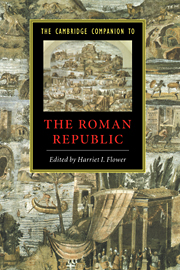Book contents
11 - Rome and the Greek World
from PART 3 - ROME'S EMPIRE
Published online by Cambridge University Press: 28 May 2006
Summary
By the middle of the second century BCE, the Roman colossus had cast a large shadow over the lands of the Greeks. The great historian Polybius, writing at that time, pronounced that Rome had subjected the whole world to its rule (Figs. 17 and 18). He added that the advance and increase of Roman dominion was now complete (3.3.9, 3.4.2)- Polybius was wrong. Rome had much more expansion in its future. But not only that. The idea that the Hellenic peoples had been subjected to the rule of the western power oversimplifies a complex process and an ambiguous relationship. Polybius saw the outcome as fulfillment of a long-standing Roman goal (1.3.6, 1.6.2-8, 3.2.6, 3.32.7, 8.1.3, 9.10.11). From the vantage point of the mid second century, the extension of Rome's hegemony over the Hellenic East seemed inevitable and irresistible. Polybius, a Greek intellectual and statesman, composed most of his massive history while in exile as a hostage in Rome. It is not surprising that he conceived a relentless march of Roman arms gradually subjecting the Greek world to its will.
The subject of Roman imperialism lends itself too easily to the hazards of hindsight. Two generations after Polybius, the Roman Empire was a fact. And Roman writers were eager to put the best face on it. Cicero affirmed that Rome gained mastery over all lands simply by coming to the aid of its allies (Cic. Rep. 3.35). Neither avarice nor lust for power motivated the expansion, just the noble aim of defending the defenseless.
- Type
- Chapter
- Information
- The Cambridge Companion to the Roman Republic , pp. 242 - 268Publisher: Cambridge University PressPrint publication year: 2004
- 1
- Cited by



